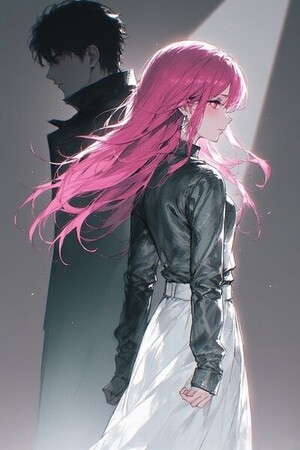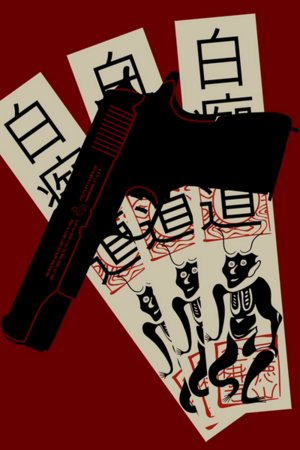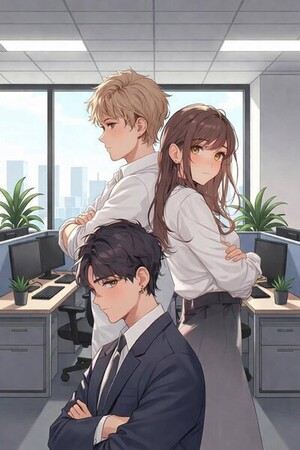Chapter 1:
Getting there...
Lu's Boys and the Man From Earth Part 3
Chapter Five: Never Dark
It was hard to sleep that night, what with the sun refusing to set. I’d never quite gotten used to it, the way the sky just hovered in a permanent late-afternoon glow, like the whole world was stuck in a long summer evening. I’d rigged up some blackout curtains from old feed sacks and tarps, but it didn’t help much. The light still bled in around the edges, soft and stubborn.
Come morning—though it felt no different from midnight—I was up at what my watch told me was five. Lu had already started the coffee and was making up a new batch of bread dough. She looked tired but proud.
"Didn’t sleep?"
"I did. Just... not much. The light makes it hard."
"Yeah. It’s like livin' in one of them Alaskan towns where the sun forgets how to set."
The rest of the crew filtered in shortly after. The boys looked like they’d slept in shifts, with Cinco stretching like a cat and Seis blinking through a yawn.
"Alright, let’s get moving. Quattro and Seis, you’re back on orchard duty. See if any apples are droppin’ early. Cinco and Tres, the rest of the barley needs bringing in. Uno and Dos, we’re gonna fire up the still."
Everyone nodded and moved like molasses. I didn’t blame them. The lack of night plays tricks on a body.
Lu packed the boys a little snack basket—cold biscuits and apple slices—and handed it off before heading to check the eggs and milk. I followed the twins into the barn.
"First batch of mash should be ready to strain today," I said, handing Dos a ladle. "Let’s run it slow. We don’t want a burnt batch."
They nodded, already more confident than yesterday. I had to admit, these boys were quick learners. Uno adjusted the fire while Dos stirred, and I got to work measuring the first drip.
"How long’s it gotta cook?" Uno asked.
"Til it runs clean. You’ll smell it when it’s right—sharp and sweet."
We made good progress by midmorning. I left them to it and went to check on the others. Seis and Quattro were beneath the apple trees, picking up windfall and stacking them in baskets. I made a mental note to press some cider this week.
Cinco and Tres had half the remaining barley loaded already. Gus had dropped off more gloves, baskets, and some wire for the baler. I waved at them and headed back inside.
Lu was in the kitchen, wiping down the counter. "We got thirty eggs and five gallons of milk today. I already set the milk to pasteurize."
"You’re on top of it, as usual," I said, grinning. "Lunch is gonna be simple—cold ham sandwiches and maybe some of those cucumbers."
"Want me to slice 'em?"
"Sure. I’ll wrangle the crew back in."
We sat outside for lunch under the constant sun. The kids didn’t seem to mind it much. They talked about their favorite things to do, and I learned Uno liked fixing things, while Quattro wanted to learn to play guitar.
After lunch, I took Uno aside and handed him my old tool belt.
"If you’re serious about fixing, you’ll need this. Start with the chicken coop—the latch keeps slippin’."
He beamed like I’d handed him a treasure chest.
Meanwhile, I had Dos help me bottle the first run of mash liquor. We labeled them and boxed them up, putting a bottle aside for Hal.
Evening came, though the sun didn’t move. It just hung there, a little lower, like it was unsure about leaving. I looked up at it and shook my head.
"Hard to tell what time it is anymore."
Lu stepped beside me. "I like it. It’s warm and cheerful."
"It is," I admitted. "But it messes with my head."
She chuckled. "Then close your eyes and pretend."
We stood there a while. Just breathing. Just standing. In the never-dark world where roosters crow at odd hours and the sky never quits, somehow, I found a kind of peace.
Tomorrow, we’d keep on building our little slice of something good.
Chapter Six: Sunset Chores That Never Come
The next day—which looked the same as the last—started with that same hazy never-ending sun drifting behind a thin veil of clouds. I woke to the sound of banging outside and the smell of burnt toast. I pulled on my boots and stepped into the kitchen where Lu was fanning smoke out the window.
"Sorry! The toast got away from me. I thought I could sneak in a quick wash while it browned."
I waved it off and poured myself a cup of her strong, earthy coffee. "Don’t sweat it. I’ve burnt worse. Once torched a whole skillet of bacon ‘cause I stepped outside to fix a fence post."
She laughed and handed me a plate. Toast might’ve been dark, but the eggs were perfect.
Outside, the boys were already buzzing. Uno was tinkering with the latch on the barn like I’d asked, and the others were tending their chores without too much hollerin'. I figured it was time to get a closer look at the barley field again.
I hopped in the mule and found Cinco and Tres sitting beside the baler, scratching their heads.
"What’s the issue, boys?"
Cinco stood and brushed hay off his arms. "The wire feeder’s jammed. We tried to fix it, but it got worse."
I leaned down to inspect it. Sure enough, they’d fed the wire in backward and tangled it around the inner spool. "Well, you gave it a shot. Appreciate that. But lemme show ya the right way."
They watched close while I cut the wire loose and reset the feeder. I threaded the wire in proper, wound the spool tight, and locked it in place.
"Always remember—wire feeds clockwise on this unit. Counter and you get a bird’s nest like that."
"Got it, Pa," Tres said, nodding solemnly.
"No harm done. That’s how ya learn."
I started the baler, and the thing hummed back to life. They climbed aboard their tractors, confidence renewed. I gave 'em a thumbs up and rode back toward the barn.
Gus was waiting, arms crossed and grinning. "You fix the mess?"
"Yup. They’d run it backwards. Not their fault—they’ve never seen a machine like that."
"Well, good training for 'em. You spoil ‘em too much, though."
"Nah, they’ll earn their keep. They’re quick."
Back in the kitchen, Lu was packing lunches for the crew—hard-boiled eggs, apples, bread ends with jam. She handed me a separate pouch.
"I threw in a little of that honey cider you made. Just a small bottle. Might help the afternoon go by quicker."
"You know me too well already."
"I just observe."
By midday, the fields were full of movement. Seis and Quattro were in the orchard again, trying to build a scarecrow out of old shirts and broom handles. Uno had fixed the chicken coop and was now taking apart an old radio I’d forgotten we had. Dos was labeling bottles in the stillery.
Even in the unchanging daylight, time had rhythm. Chores, meals, sweat, laughter. The boys had started calling each other by their new names naturally now.
After supper—some kind of stew Lu improvised from beans and ham—the kids sat on the porch playing a game with sticks and rocks. Lu brought me a cup of cider and sat beside me.
"Still thinking about home?"
"Sometimes. But not the way I thought I would."
She nodded. "This place has a way of growing on you."
The sun dipped ever so slightly, but not enough to count. It felt like it had just paused. I leaned back, sipping slowly, and took in the smell of dust and earth and livestock.
If this was space, well, I could get used to it.
Chapter Seven: Critter Trouble
By the time morning rolled around—again, in that vague, sun-never-quite-left kind of way—the trap robot had returned to the barn. Lu and I met it there, curious to see what it had found. The machine beeped twice and released its catch tray.
Inside the metal mesh cage were two hissing, coiled snakes. One was long and black, the other mottled brown with a faint rattle on its tail. They slithered and twisted against the bars, clearly unhappy with the arrangement.
"Well, I'll be," I muttered. "Looks like we got ourselves a pair of uninvited guests."
"Are they poisonous?" Lu asked, peering cautiously but not stepping back.
"Sure look like they might be. That one has a rattle, and where I come from, that’s a red flag. Better not mess around."
Just then, the second trap bot rolled in from its patrol zone near the southern edge of the orchard. It stopped beside the first and whirred open its tray. Inside was a thin, ragged-looking fox with a nicked ear and an irritated look on its face. It growled low and tried to chew through the metal.
"Well, ain’t this a day for surprises," I said. "Lu, go get my radio. Let’s call Gus."
She nodded and trotted off while I kept a careful eye on our new guests.
Within the hour, a small truck rumbled up the main road and came to a halt near the barn. A squat, balding man with sharp eyes and heavy gloves stepped out.
"You the one with the vermin issue?" he called out.
"That’s us. Snakes and a fox."
He introduced himself as Tanner, one of Gus’s folks. He gave the traps a quick look, nodded once, and then started transferring the critters into specialized crates. He handled the snakes with a calm, efficient ease that made me think he’d done this a hundred times. Maybe more.
"They’ll be relocated far from here," he said. "No charge. Gus said to take care of ya."
"Appreciate it."
He gave a polite nod, loaded the crates into his truck, and took off down the road without much else said.
Not long after, Gus himself showed up, riding the same old cart I’d seen him use before. He tied off the mule and plopped down on my porch bench like he’d done it a thousand times.
"You got quite the operation already," he said, nodding toward the barn.
"Just doing what I know. Your crew helped a lot. Lu’s a gem."
"She is," Gus agreed, rubbing his chin. "You know, over on my land, we’ve got corn. Not just a patch, but miles. Hundreds of acres. Grows tall, sweet, and fast. Special breed they gave us when we came through. Grows under this ever-shinin’ sun like it was made for it."
I whistled. "Must take an army to keep that going."
"More’n a hundred hands," he confirmed. "Some like yours. Some older. They all live on my stretch. Got schools, markets, and a doc even. It’s a real town now."
"You ever think about expanding further?"
"Nah," he said with a small smile. "Expansion don’t mean much when you’ve already got more than you need."
We sat in silence a while, the ever-glowing sun casting soft shadows across the porch. The air was warm, but not uncomfortable. Peaceful.
"You ever get used to the light?" I asked.
"You stop noticing," Gus said simply. "You sleep when you're tired. You eat when you're hungry. And time starts to mean less than it used to."
I nodded, feeling that truth settle in my bones.
"Well," Gus said, rising with a groan, "I’ll leave you to it. But you need anything—tools, hands, advice—you holler. You’re one of us now."
"Thanks, Gus. Really."
"Don’t mention it. Welcome to the sun that never sets."
With that, he tipped his hat and rode off, back toward his corn kingdom. I watched him disappear into the golden light, thinking maybe I was starting to feel like I belonged here too.




Please sign in to leave a comment.